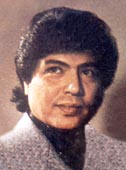
Role of the Artist Balfaqih in Modernizing the Songs of Folklore in the Arabian Peninsula [Archives:1999/09/Last Page]
March 1 1999

He carried out the mission very efficiently and successfully. Today, the Hadhrami songs are not only famous in the Gulf, but also in the whole Arab World.
Balfaqih moved from his home town of Tarim, Hadhramaut governorate to Aden in the late forties to teach in its schools. He carried with him his love for folklore songs which he used to sing wherever he went.
In the fifties, the artistic movement in Aden witnessed a surge in its activity and the Aden musical league was formed in 1954 bringing together many young singers. Abubakar frequented that league where he met Ahmad Qassem who encouraged and supported him.
In the late fifties, Balfaqih maintained a strong artistic relationship with the famous poet Lutfi Aman and together they presented a number of famous songs.
He then sang distinctive Hadhrami songs through cooperation with the poet Al Mihdhar in the early sixties that heralded a new birth for Balfaqih. No doubt that period greatly refined the talent of Balfaqih who described it as that of strong youthful enthusiasm. He said that in the mid seventies his voice grouped a mixture of old and modern tunes and matured. Balfaqih emigrated to Saudi Arabia in the early sixties in a bid to further carry the Hadhrami song to new frontiers. It was from there that he spread it to the outside world in what was described as the first stage in his artistic march.
He renewed those songs through introducing new musical compositions and recorded the new productions in Lebanon. The songs were largely welcomed in Yemen, the Arabian Peninsula and even in the Arab World.
In the second stage, Balfaqih returned, following a long interval with Gulf folklore songs in the mid seventies. As usual he was successful and his music was received with resounding applause. Our singer, in addition to being a distinguished singer, is a poet. His poems were sung by famous Arab singers such as Walid Tawfiq in Lebanon.
During the third stage, Balfaqih played a major role in modernizing the Sanaa folkore songs and spreading it outside the Yemeni borders. He introduced various musical instruments into those songs that were used to be played with only one instrument, largely the lute.
He said that tackling the Sanaa folklore songs was an adventure for him, since he was not originally from that area but indulged in the experiment despite his fears and concerns. He, as usual, was a success and managed to modernize that art that was known in the
Sanaa region for more than 500 years. Balfaqih excelled in his new Sanaa songs during the 1984 festivities of the 26 September revolution anniversary which witnessed a
massive audience.
We still expect more and more from that refined artist who merges the traditional with the modern in a unique way that bought him fame across the Arab World.
By: Saleh Abdulbaqi,
Art Editor,
Yemen Times
——
[archive-e:09-v:1999-y:1999-d:1999-03-01-p:./1999/iss09/lastpage.htm]


